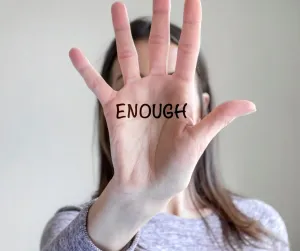People who go no contact with parents are ridiculed on a regular basis. Some of the things we hear is we took the easy way out. We’re called selfish and mean. Some even say we’re
I won’t pretend there aren’t some people who use going no contact as part of an immature stunt.
But this is the exception, not the norm. For many of us, in fact, it couldn’t be further from the truth.
The decision to go no contact is painstakingly difficult. It can take years for us to come to that decision. All the while questioning whether or not we’re doing the right thing. All the while feeling guilty about about what comes next.
And we’re so incredibly afraid it will be the wrong thing to do and cause irreparable damage.
Many of us feel responsible for how it will make our parents feel. As though we somehow owe them for our existence.
And don’t get me started on the cultural and social stigma. As mentioned, we are judged. Very harshly. So often there’s also shame.
So is going no contact with parents easy?? Hah!
What is “going no contact?”
No contact is another way of saying estrangement. In the context of this article, I’m specifically refering to family estrangement. So what is family estrangement?
For some people, it means limited or reduced contact with a family member (or members). This includes physical contact as well as emotional contact.
For many people, it means completely removing contact for a long period of time. And for some people, a long period of time really results in being forever.
Who is meant by family can also vary. For some it means a parent or parents. It could be siblings. Grandparents. Really any family member.
Survey research indicates that 27% of American adults of gone no contact with at least one family member. Learn more about how common parental estrangement is from Newport Institute.
Personally, I’ve gone no contact with almost everyone.
How to go no contact
There is no one path. Many people avoid it at all costs by trying other methods, such as setting boundaries and limiting contact. You could try family therapy or counseling. And, of course, there’s also just… putting up with it, whatever “it” is.
Once you’ve finally come to the conclusion that this is what needs to happen, you’ve really just gotta leap. There’s no easy way about it. You can’t ease the bandaid off. You’ve gotta just grab and yank.

It’s an incredibly emotional process.
When I finally pulled the bandaid off, I felt immediate and intense relief. As the cliché goes, I could literally feel the weight lift off of my shoulders. It was an immense weight that had been holding me down for most of my life.
I’m sure many people feel this way. At first.
You see, that’s not where it ends. That’s not when resolution occurs (if it ever does). That’s really where the grieving process begins.
Grieving your way through the no contact process
Wait a minute. What do you mean by grieving? Didn’t you want this? Wasn’t this your choice?
I did. And it was. And yet…. grief.
Some people think of grieving only in the context of death. Grieving can and often occurs with the loss of any person or thing. The death of a loved one, certainly. A divorce or break up. The loss of a house. The loss of a job. The loss of a friend. These are all common causes for grief.
But you also grieve when going no contact with parents or other family members. Remember, we did not take the choice to go no contact lightly.
And this person we’ve let go of still exists. So it’s different from losing someone to death. Or even divorce. (Please note I’m not making a hierarchical comparison. One isn’t better or easier. They’re just different.)
Despite being different we still go through the 5 stages of grief.
The 5 stages of grief
There are 5 stages of grief that any grieving person experiences. Although originally formulated for ill persons, they’re widely used for all forms of loss. The stages of grief for family estrangement are the same.
This stage is about denying the reality of what’s going on. It’s a defense mechanism that helps numb you to the pain.
Anger is a masking device used to help hide other emotions and pain you experience. Examples might be resentment, bitterness, and fear. Sometimes our anger is misdirected as a result, meaning we take it out on the wrong people or object.
In this stage, we’re prone to making “what if” or “if only” type statements. This can be tied to feelings of helplessness. Depending on the cause for going no contact, these statements were likely already prevalent. “If only I had done this, maybe my mother would be different.”
Unlike the previous stages where we avoid feeling our feelings, in this stage we’re right in the middle of them. This is where you may feel lost, sad, confused. This is also where you can process your feelings (because you can’t process feelings that you don’t let yourself feel). This is where healing happens.
This stage name feels misleading. It seems to imply that yay, you’ve accepted it and can now move on! As though your grief is over. Unfortunately that’s not the case. But it does mean that you’ve accepted this loss. You’ve accepted its place in your life. And healing happens here, too.
It’s important to note that these stages are not linear. In other words, you don’t go through them in sequential order. You may be stuck in one for a while, hop around, and go backwards before you go forwards.
There is no one path. It’s messy. It’s hard. And it’s different for everyone.
But it’s also different for someone going through ambiguous loss.
Ambiguous loss and family estrangement
When you go no contact with a parent, you can and often do experience two different losses. The loss of the parent you had. And the loss of the parent you needed and deserved.
There’s a type of grief that many people don’t even realize they experience. It’s called ambiguous loss.
Ambiguous loss is a type of loss when there is no closure. With most loss, like a death, you experience some form of closure. An example may be a funeral or other ceremony. With divorce, it may be the filing of court papers or the selling or disposal of a wedding ring.
But when you go no contact, there is no resolution. There’s no closure. Because although we’re saying goodbye to the physical person – there’s typically no real ending. And we cannot say goodbye to the parent who never existed. The one we needed and deserved.
Okay, so maybe that part makes sense to you. Maybe you can see how we might mourn the loss of the parent we never truly had but always dreamed of. And ached for.
Unfortunately, this can cause those of us who go no contact to remain stuck in the grieving process. And it can feel like ongoing trauma because there’s no way to resolve it.
This is the loss that never ends…
There’s another way that loss from going no contact differs from other forms of loss, such as a death.
Although this person remains alive, we still have no access. It becomes this constant reminder that there’s someone out there who could fit this role but doesn’t.
They could be there, but they aren’t.
This comes up in so many painful ways that only those experiencing it are likely to notice.
Loss of ties to history
We lose access to objects like family photos, recipes, and heirlooms. On the face of it, this is a bummer. But it comes up at random times, too. Like when your child’s school asks for photos of you when you were a child. And you don’t have any. Or when the holidays roll around and you realize you never got your favorite cookie recipe that your grandmother used to make.
Loss of familial support
You know when you’ve had a bad day and you’d love nothing more than to call your mom? Yeah, we can’t do that. (I mean, we could, but…) Or when you could use your dad’s shoulder to cry on. Or if you’d like support or advice when parenting. Granted you may not have had these things in your relationship to begin with – hence the no contact – but now you don’t even have the mediocre version of it. And every time you wish you could just reach out, you have to make the active and very conscious decision to not call.
Loss of family for our children
Trying to explain to our children how they DO have grandparents but that you’ve made the choice to not have a relationship with them is hard. And I mean hard. Because your children want and deserve an extended family. They see their peers with their families and they want that, too. Grandparents attending school functions. Cousins to play with like friends. It’s heartbreaking telling your child they won’t have that. And the guilt is strong.
They never stop disrespecting you
Some of us also deal with family members who don’t respect our “no contact” boundary. I mean, they didn’t respect our prior boundaries so it’s not necessarily surprising. But it IS hard. So very hard. Because they keep putting their foot in the door that you keep trying to close. It definitely does nothing to support their cause and instead creates big upset for you.
So when people accuse us of being selfish and taking the easy way out, it couldn’t be further from the truth. Yes, we made a choice to improve our own well-being the best we can. But it came at an immense loss. A loss we feel every day.
Register for my FREE Intro to Anger Management Course
Are you struggling to manage your anger? If so, then this free Anger Management Course is for you.





